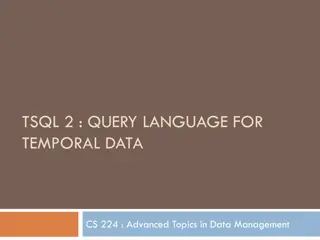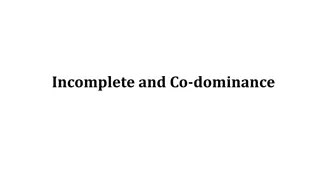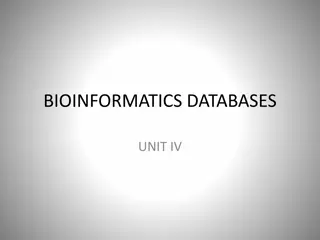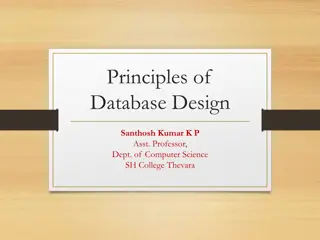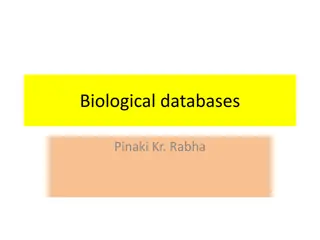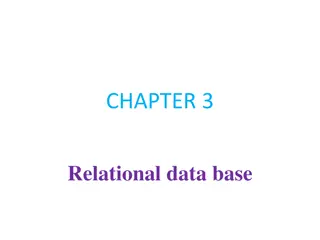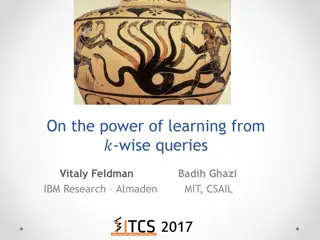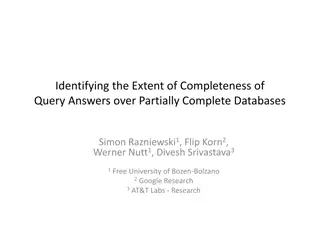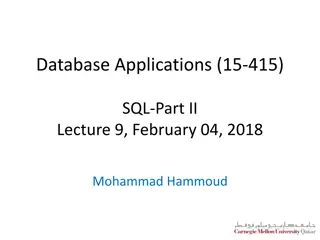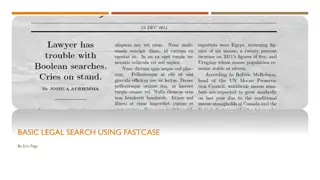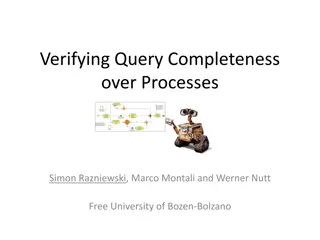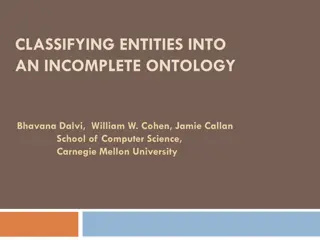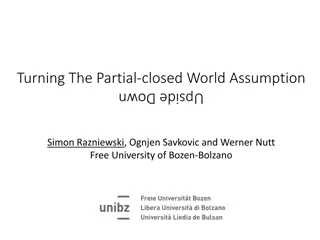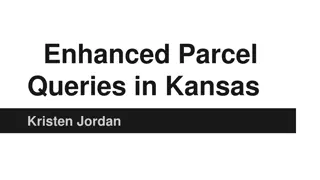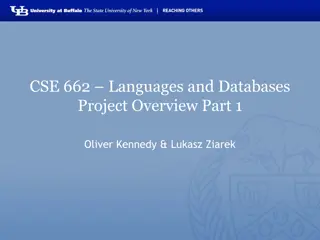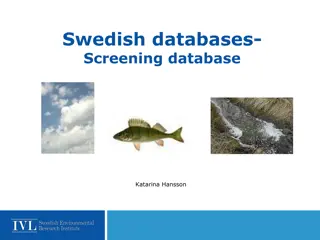Study on Completeness of Queries over Incomplete Databases
Investigation into query completeness over incomplete databases, highlighting the importance of data completeness for accurate query answering. Examples and reasoning provided to illustrate the challenges and considerations in ensuring query completeness.
Download Presentation

Please find below an Image/Link to download the presentation.
The content on the website is provided AS IS for your information and personal use only. It may not be sold, licensed, or shared on other websites without obtaining consent from the author.If you encounter any issues during the download, it is possible that the publisher has removed the file from their server.
You are allowed to download the files provided on this website for personal or commercial use, subject to the condition that they are used lawfully. All files are the property of their respective owners.
The content on the website is provided AS IS for your information and personal use only. It may not be sold, licensed, or shared on other websites without obtaining consent from the author.
E N D
Presentation Transcript
Completeness of Queries over Incomplete Databases Simon Razniewski Joint work with Werner Nutt Free University of Bozen-Bolzano
Introduction Data completeness: important aspect of data quality Query answering over incomplete data: extensively studied Query Completeness: little work 30.08.2011 Completeness of Queries over Incomplete Databases 2
Bolzano is in the Province of South Tyrol Bolzano Autonomous, trilingual province in the north of Italy 30.08.2011 Completeness of Queries over Incomplete Databases 3
School Data in South Tyrol Decentrally maintained database Statistical reports ?? notoriously incomplete correctness important 30.08.2011 Completeness of Queries over Incomplete Databases 4
Example Database Schema Pupil(pname, age, sname) School(sname, type, language) 30.08.2011 Completeness of Queries over Incomplete Databases 5
Completeness Reasoning Example Suppose we have data about pupils from all German schools Italian schools, except the high school Da Vinci Ladin schools, except the middle school Gherd na Will the following query get a correct answer? How many pupils are at German primary schools? Yes (if we also have all German primary schools) 30.08.2011 Completeness of Queries over Incomplete Databases 6
Completeness Reasoning Example (Cntd) Suppose we have data about pupils from all German schools Italian schools, except the high school Da Vinci Ladin schools, except the middle school Gherd na Will the following query get a correct answer? How many Ladin pupils are there? Maybe not, pupils from Gherd na could be missing 30.08.2011 Completeness of Queries over Incomplete Databases 7
Overview Formalization Incomplete Database Query Completeness Table Completeness Reasoning for Conjunctive Queries Bag Semantics Set Semantics Aggregate Queries 30.08.2011 Completeness of Queries over Incomplete Databases 8
Incomplete Database (Motro 1989) Incompleteness needs a complete reference Incomplete databases are pairs of an ideal database an available database Da Diand D = (Di, Da) such that Da Di 30.08.2011 Completeness of Queries over Incomplete Databases 9
Incomplete Database - Example D = (Di, Da) Paul and Andrea are pupils in the ideal database Di= { pupil( Paul , 11, Da Vinci ), pupil( Andrea , 14, Gherd na ) } Our available database misses the fact that Andrea is a pupil Da = { pupil( Paul , 11, Da Vinci ) } 30.08.2011 Completeness of Queries over Incomplete Databases 10
Query Completeness (Motro 1989) Query Q The set of answers to Q is complete Notation: Compl(Q) Semantics: (Di, Da) Compl(Q) Q(Di) = Q(Da) iff 30.08.2011 Completeness of Queries over Incomplete Databases 11
Table Completeness (Levy 1996) Table pupil(pname,age,sname) Our available db contains all pupils from Ladin schools Formally: pupili(p,a,s) schooli(s,t, Ladin ) pupila(p,a,s) If (p, a, s) is a Ladin pupil according to the ideal db, then (p, a, s) is a pupil in the available db This is a full TGD (= tuple generating dependency) 30.08.2011 Completeness of Queries over Incomplete Databases 12
Table Completeness (Cntd) Our available db contains all pupils from Ladin schools TGD: ?c = pupili(p,a,s) schooli(s,t, Ladin ) pupila(p,a,s) Notation: Compl(pupil(p, a, s); school(s, t, Ladin ) Semantics: (Di, Da) Compl(pupil(p,a,s); school(s, t, Ladin )) iff (Di, Da) ?c 30.08.2011 Completeness of Queries over Incomplete Databases 13
Completeness Reasoning We have complete data about pupils from all German schools Italian schools, except the high school Da Vinci Ladin schools, except the middle school Gherd na TC Statements C Query How many pupils are at German primary schools? QC Statement Compl(Q) TC-QC entailment C Compl(Q) ? 30.08.2011 Completeness of Queries over Incomplete Databases 14
Completeness Reasoning (Cntd) TC-QC: table completeness entails query completeness Compl(R1; G1), , Compl(Rn; Gn) Compl(Q) - bag semantics Complbag(Q) - set semantics Complset(Q) QC-QC: query completeness entails query completeness Compl(Q1), , Compl(Qn) Compl(Q) TC-TC: table completeness entails table completeness Compl(R1; G1), , Compl(Rn; Gn) Compl(R; G) 30.08.2011 Completeness of Queries over Incomplete Databases 15
What is Known? Characterizing QC-QC entailment: Compl(Q1), , Compl(Qn) Compl(Q) Existence of a rewriting is a sufficient condition (Motro 1989) Deciding TC-QC entailment: Compl(R1; G1), , Compl(Rn; Gn) Compl(Q) Decision procedure for trivial cases (Levy 1996) For reasoning w.r.t. a concrete database instance, data complexity is coNP-complete for first-order queries and TC statements (Denecker et al. 2007) 30.08.2011 Completeness of Queries over Incomplete Databases 16
TC-QCbag Canonical TC Statements How many 12-year old pupils are at the Italian schools?'' Q(COUNT(p)) : pupil(p, 12, s), school(s, t, Italian') Q can be answered correctly if - every 12-year old pupil from an Italian school is there - every Italian school with a 12-year old pupil is there That is, if the database satisfies canonical completeness statements for Q - Compl(pupil(p, a, s); school(s, t, Italian'), a = 12) - Compl(school(s, t, l); pupil(p, 12, s), l = Italian') 30.08.2011 Completeness of Queries over Incomplete Databases 17
TC-QCbag Canonical TC Statements (Cntd) Query Q( x) : A1( x1), , An( xn), The canonical table completeness statement for atom Aiis Compl(Ai; A1, , An-1, An+1, , An) CanQis the set of canonical completeness statements for all atoms of Q Proposition: (Di, Da) CanQ (Di, Da) Complbag (Q) implies 30.08.2011 Completeness of Queries over Incomplete Databases 18
TC-QCbagReduces to TC-TC We saw: CanQ Complbag (Q) ( Complset (Q)) Theorem: Complbag(Q) CanQ For any set C of TC-statements: iff C Complbag(Q) TC-QC TC-TC C CanQ 30.08.2011 Completeness of Queries over Incomplete Databases 19
TC-TC Entailment = Query Containment C1= Compl(pupil(n, a, s); True) C2= Compl(pupil(n, a, s); a = 12') Obviously, C1entails C2 Q1(n) : pupil(n, a, s) Q2(n) : pupil(n, a, s), a = 12' Q2is contained in Q1 C1entails C2 because Q2is contained in Q1 30.08.2011 Completeness of Queries over Incomplete Databases 20
TC-TC Entailment = Query Containment (Cntd) TC statements describe parts of tables that are complete TC statements entail each other if the parts described are contained Entailment of TC from TC can naturally be reduced to query containment Theorem: can be reduced to each other in linear time. Let L be a class of conjunctive queries that (i) contains for every relation the identity query (ii) is closed under intersection Then TC-TC entailment and containment of unions of queries 30.08.2011 Completeness of Queries over Incomplete Databases 21
Complexity Classes of conjunctive queries: CQ: Conjunctive queries with comparisons over dense orders RQ: Relational conjunctive queries (i.e., without comparisons) LCQ: Linear conjunctive queries (i.e., without self-joins) LRQ: Linear relational conjunctive queries 30.08.2011 Completeness of Queries over Incomplete Databases 22
TC-QCbag- Complexity Query Language LRQ LCQ RQ CQ LRQ in PTIME in PTIME NP NP TC Statement Language RQ in PTIME in PTIME NP NP ? ? LCQ coNP coNP 2 2 ? ? CQ coNP coNP 2 2 30.08.2011 Completeness of Queries over Incomplete Databases 23
TC-QCset TC-QCsetis Containment w.r.t. to TC statements C Qi= Qa iff C Qi Qa (monotonicity of Q) Containment w.r.t. TGDs C Qi Qa iff ?c Qi Qa More complex than TC-TC 30.08.2011 Completeness of Queries over Incomplete Databases 24
TC-QCbag- Complexity TC-QCset Query Language LRQ LCQ RQ CQ NP ? LRQ in PTIME in PTIME NP 2 TC Statement Language NP ? RQ in PTIME in PTIME NP 2 ? ? LCQ coNP coNP 2 2 ? ? CQ coNP coNP 2 2 30.08.2011 Completeness of Queries over Incomplete Databases 25
Completeness Reasoning for Aggregate Queries SUM and COUNT: similar to bag semantics MIN and MAX: similar to set semantics 30.08.2011 Completeness of Queries over Incomplete Databases 26
QC-QC and Query Determinacy Motro s idea: Look for rewritings Given Q1(x) : R(x), S(x) Q2(x) : T(x) Suppose we know Compl(Q1) and Compl(Q2) Consider Q(x) : R(x), S(x), T(x) We see: Q can be rewritten as Q(x) : Q1(x), Q2(x) Therefore, we conclude Compl(Q) 30.08.2011 Completeness of Queries over Incomplete Databases 27
QC-QC and Query Determinacy (Cntd) Queries Q1, , Qn, Q Determinacy: Q1, , Qndetermine Q, written Q1, , Qn Q, iff Q1(D) = Q1(D ), , Qn(D) = Qn(D ) implies Q(D) = Q(D ) for all pairs of dbs D, D QC-QC Entailment: Compl(Q1), , Compl(Qn) entails Compl(Q), iff Q1(Di) = Q1(Da), , Qn(Di) = Qn(Da) implies Q(Di) = Q(Da) for all pairs of dbs Di, Da where Da Di Proposition: Q1, , Qn Q implies Compl(Q1), , Compl(Qn) Compl(Q) 30.08.2011 Completeness of Queries over Incomplete Databases 28
QC-QC and Query Determinacy (Cntd) However: Decidability of determinacy for conj. queries is open (Segoufin/Vianu 05) Necessity of determinacy for QC-QC entailment is open Theorem: For boolean queries, existence of rewritings, determinacy and QC-QC entailment coincide 30.08.2011 Completeness of Queries over Incomplete Databases 29
Where Can Completeness Statements Come From? Any conclusion only as correct as the statements it is derived from ~> On which basis can someone give a completeness statement? Someone knows some part of the real world E.g., a class teacher knows all his students The method of data collection is known to be complete E.g., at the deadline for enrolment all forms must be present Cardinalities of parts of the real world are known and the method of data collection is correct E.g., no nonexisting schools are registered and the number of schools in South Tyrol is known 30.08.2011 Completeness of Queries over Incomplete Databases 30
Conclusion Framework for modelling completeness query answers (Motro: QC statements) parts of databases (Levy: TC statements) Reasoning Complexity analysis of TC-TC and TC-QC Connection between determinacy and QC-QC Reasoning in the presence of instances Current work Schema constraints (keys, foreign keys, finite domains) Null values Prototypical implementation 30.08.2011 Completeness of Queries over Incomplete Databases 31
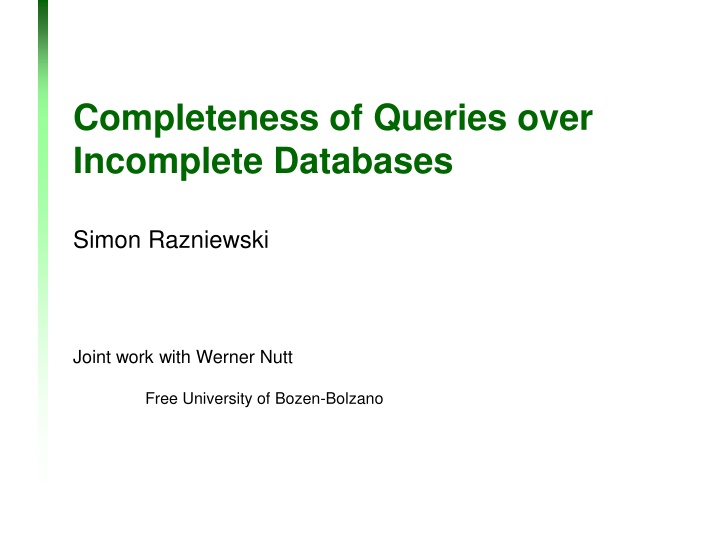
 undefined
undefined


